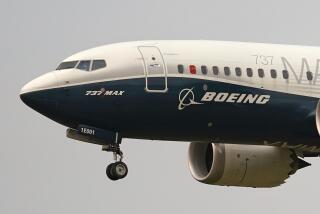Boeing Wins Big Military Contract
- Share via
Boeing Co. won a significant Pentagon contract Monday--potentially worth $6 billion to $7 billion--to develop a new generation of radios that would allow forces on the land, sea and air to communicate more quickly and easily.
U.S. military strategists hope the system will dramatically improve battlefield coordination between different military branches.
In a surprise boost to Southern California’s defense industry, Boeing’s Seal Beach-based space and communications unit beat out favorites General Dynamics Corp. and Raytheon Corp. for a contract with an initial potential value of at least $2 billion. Follow-up orders for additional radios and potential foreign sales could boost value of the so-called Joint Tactical Radio System contract to as much as $7 billion, Boeing executives said.
It marked the second time this year that Boeing has won a major Army contract after having historically focused on aerospace-related contracts. In March, the company won the Future Combat Systems contract with a potential value of at least $4 billion to design an entire network of new weapons, communication systems and intelligence-gathering sensors.
“What is striking about this is that Boeing keeps winning contracts that have traditionally been outside its domain,” said Loren Thompson, a defense analyst with Arlington, Va.-based think tank Lexington Institute. “Boeing has basically been an aircraft company with some space programs, but this tells you they are successfully diversifying into areas where they weren’t well-established before.”
The contract represents a big boost locally, particularly to Boeing’s operations in Anaheim, which has been garnering increased attention for developing battlefield command and control systems that could revolutionizing the way battles are fought.
Boeing engineers in Anaheim will spearhead the development of both the radio technology and the Army’s Future Combat System. Not far west of Boeing’s Anaheim facility along California 91, TRW Corp. engineers in Carson will help integrate the radio system for ground forces, Boeing said.
“We’re absolutely thrilled,” said Allen Ashby, general manager for Boeing’s battle management and strategic systems business in Anaheim. “This will be a critical part of the integrated battle space.”
Ashby said there would be an immediate need for about 200 engineers to work on the program and an additional 200 within 10 months.
Under the contract, Boeing will develop a family of radios capable of transmitting voice, video and data among all the military services. The radios will not resemble the familiar military field radios but rather will look like advanced cell phones, with displays and e-mail capabilities. Radios in vehicles will more closely resemble laptop computers.
The radios will use a common software that will allow individual soldiers on the battlefield to communicate with anyone else, whether they’re in a plane, armored vehicle or aboard a ship. The entire system will resemble a mobile Internet system, providing secure communications and strictly defined access for each radio.
Currently, U.S. forces use a disparate system of radios and frequencies that have hindered coordination. An infantry unit, for instance, operates on one frequency, tanks on another and supporting aircraft on yet a whole different system and frequency.
Representing one of the most notorious cases of the military’s jumbled communication system, a soldier in the invasion of Grenada had to use his personal telephone calling card at a local pay phone to call in air support. The embarrassing scenario helped push efforts to develop a common radio system.
In addition to designing the system, Boeing will oversee manufacturing of the initial 20,000 radio units, most of which will be installed on vehicles and helicopters. The Pentagon sees making 100,000 units in the second round of the program, with a goal of eventually fielding hand-held devices for individual infantrymen.
The unit would not only be able to send and receive voice communications but also e-mails as well as maps showing the locations of both U.S. and enemy forces.
The announcement was made after the markets closed. Boeing shares were off 23 cents to $42.74 on the New York Stock Exchange.
More to Read
Inside the business of entertainment
The Wide Shot brings you news, analysis and insights on everything from streaming wars to production — and what it all means for the future.
You may occasionally receive promotional content from the Los Angeles Times.










